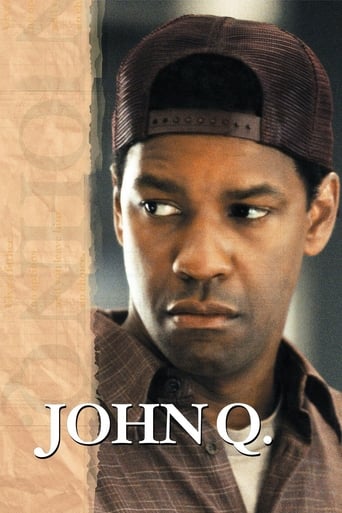

John Quincy Archibald takes a hospital emergency room hostage when his insurance won't cover his son's heart transplant. John Q didn't please critics (like most films this days) but it's action packed tension, the amazing and moving perfomance from Denzel Washington and the father and son relationship alongside the moving ending makes this an interesting and terrific drama that hits some messages and tells somethings that needed to be said. (A+)
... View MoreAll she does is bark at the husband that he needs to do something, needs to try harder at everything he does. Furthermore: first, she's in the doctors' faces about inquiring what's wrong with her son while they're trying to focus on diagnosing him; then, she's repeatedly stressing to James Woods and Anne Heche at the table that she doesn't understand why this is happening because just that morning, he was fine. I wanted to be at the table with all of them and jump down her throat, "Well he's not fine anymore, obviously, so get that out of your head and just listen and comprehend what they're trying to draw in crayon for you."
... View MoreReleased in 2002 and directed by Nick Cassavetes, "John Q" stars Denzel Washington in the title role as a factory worker in the Chicago area whose son desperately needs a heart transplant, but the biyatch at the hospital maintains that he doesn't have enough coverage (Anne Heche). John feels he has no choice but to take radical measures to save his son, even if it costs his life. James Woods plays the main doctor while Robert Duvall & Ray Liotta appear as the top officers. Kimberly Elise is on hand as John's wife while David Thornton & Laura Harring play the couple's best friends.The movie effectively shows how effed up the American health care system is and appears to promote universal health care. While the system obviously needs fixed, Nobamacare wasn't the way to do it; and, in many ways, made things worse. Nobamacare didn't even accomplish it's supposed goal, which was to grant health care to ALL Americans, at least that's what the 'powers that be' maintained; as of this writing there are still 27 million citizens who are uninsured, and probably far more than that. In reality Nobamacare was basically a Demoncrap Federal power grab.But all that is irrelevant to whether or not the movie is effective, which it is. It's not believable, but it's certainly entertaining. What do I mean by not being believable? The tone is generally realistic, but the characters and dramatics are so amped up the movie is sometimes almost a parody (almost). A good example is how over-the-top uncaring Heche's character is compared to the low-key evil of Nurse Ratched in "One Flew Over the Cuckoo's Nest" (1975). The histrionics amongst the hostages is another prime example.Speaking of the hostages, at around the 40-minute mark the movie settles into a confined-location flick. These kinds of stories involve several characters, usually strangers, who are stuck in a particular environment wherein they are forced to get to know each other and interact in order to survive (2007's "The Mist" is a good example). The producers assembled a notable cast for this stock plot (Eddie Griffin, Shawn Hatosy, Heather Wahlquist, Troy Winbush, Ethan Suplee and a few others, including Woods) with Griffin, Hatosy, Winbush and Wahlquist standing out. The latter, incidentally, has a great "Whoa Mama!" scene.The opening scenes seem somewhat contrived, but the movie quickly finds its footing and compellingly embroils you in the events until the close, despite the aforementioned overblown moments. Of course, Washington is excellent as the likable protagonist turned antihero. You can't help but sympathize with him even though what he does is very foolish. Bold, yes, but foolish.The movie run 116 minutes and was shot in Ontario (Solina, Cambridge, Ajax, Hamilton, Oshawa & Toronto) and Montreal with the mountain scenes shot in Alberta (Canmore & Cochrane) and establishing shots in Chicago. WRITER: James Kearns.GRADE: B+
... View MoreUgh. The whole movie is just a bunch of propaganda about free, universal health care. The story is moving and the acting not bad. In the end it actually tells you that we should have universal health care. Just liberal Hollywood propaganda. Maybe one of the most liberal films ever made. Conservatives and non-socialists don't watch it will hurt you nerves.(speaking from personal experience). Of course, the kid should not be left to die; private charity is way better than government welfare, something that the film deliberately hides. It is so one-sided and wants to present all people opposing socialist health care as evil. I know this is a film of 2002 but if it was made today it would be a good propaganda weapon for Obama's socialist policies.
... View More